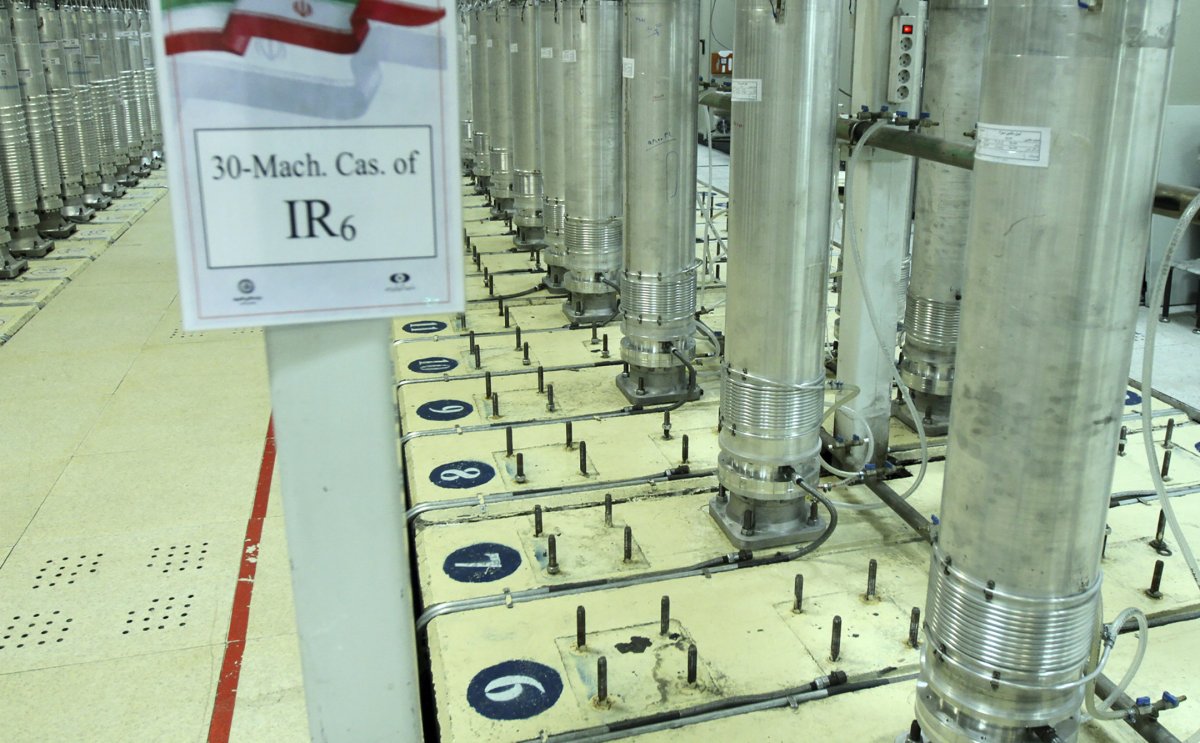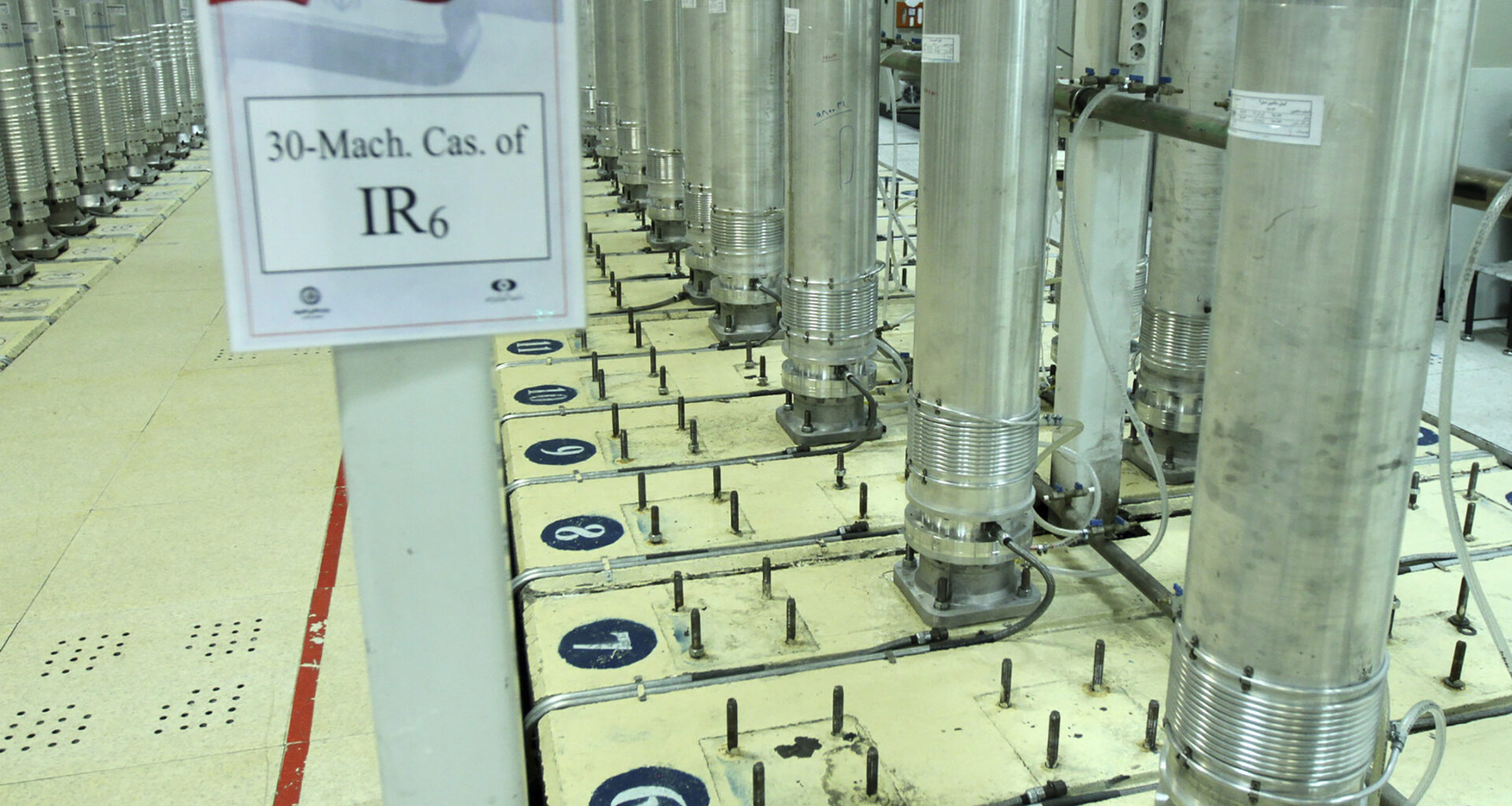Iran’s recent acceleration in its enrichment of uranium is close to bomb-grade, according to Reuters.
Rafael Grossi, the director general of the International Atomic Energy Agency (IAEA), told the outlet that Iran was increasing its enrichment of uranium to 60 percent, getting closer to the 90 percent level needed for weapons grade.
Iran’s ability to arm itself with nuclear weapons is significant as tensions in the region continue to increase with the war in Gaza.
Newsweek reached out to the Ministry of Foreign Affairs of the Islamic Republic of Iran for comment via email outside of business hours. Newsweek also reached out to the IAEA for comment via a form on their website.

Uranium enrichment centrifuges at a facility in central Iran. A report from recently revealed that Iran has been increasing its uranium enrichment to dangerous levels.
Uranium enrichment centrifuges at a facility in central Iran. A report from recently revealed that Iran has been increasing its uranium enrichment to dangerous levels.
Uncredited, Atomic Energy Organization of Iran/Associated Press
The IAEA confirmed this information in a confidential report to member states.
Grossi visited the Fordow nuclear plant in Tehran last month, and said that although there are groups in Iran calling for the government to “do its own thing” on nuclear weapons, in his conversations with the government, “that doesn’t seem to be the path of choice, but they sometimes refer to this as something they might need to reconsider. I hope not. I have told them this would be a regrettable choice,” as reported BBC News.
In response to Grossi’s remarks about Iran’s increase in uranium enrichment, Esmaeil Baqaei, the spokesperson for the Iranian Foreign Ministry, said: “Mr. Grossi’s remarks pointed to the confrontational and unconstructive moves of the three European countries and the US in the Board of Governors, where they proposed and passed a resolution against Iran without any logical justification or legal basis.” The three European countries is referring to the UK, Germany, and France.
He added, “Mr. Grossi came to Iran with initiatives, but it was the three European countries and the United States that, by pursuing a policy of pressure and abusing the Board of Governors, rendered the director general’s efforts fruitless.”
Baqaei also noted that Iran’s nuclear activity is being conducted in compliance with the Non-Proliferation Treaty and the Comprehensive Safeguards Agreement under IAEA supervision.
Iran has previously maintained that it rejects “weapons of mass destruction” but will equip itself to “the extent necessary for the defense of Iran.”
An anonymous Western diplomatic source spoke to Reuters about the ramifications of Iran’s uranium enrichment increase and said: “The information reported by the Director General of the Agency, indicating a significant increase in Iran’s capacity to produce highly enriched uranium at 60%, is extremely serious.
“These measures have no credible civilian justification and could, on the contrary, directly fuel a military nuclear program if Iran were to take the decision…They are in contradiction with Iran’s declarations on its willingness to return to credible negotiations.”
Most of the commercial nuclear power reactors today require uranium that is “enriched in the U-235 isotope” for their fuel, according to the World Nuclear Association.
Uranium is enriched through the process of increasing the isotopic proportion of U-235 from 0.72 percent to up to 94 percent, according to the IAEA. This can be done through a variety of methods including separating the uranium isotopes with a laser, or through gaseous diffusion, in which uranium hexafluoride is fed through pipes with filters to separate the molecules in the uranium isotopes.
Iran has increased its nuclear activities since 2018, after president elect Donald Trump curated America’s exit from the Joint Comprehensive Plan of Action.
Iran’s relations regarding nuclear weapons activities have been tense since then, with some IAEA inspectors visiting barred from surveilling the facilities.
Grossi has previously stressed the importance of negotiating with Iran regarding nuclear activity sooner rather than later, and Mohammad Eslami, the head of Iran’s Atomic Energy Organization, said: “We have repeatedly said any resolution seeking to intervene in the Islamic Republic of Iran’s nuclear affairs will be definitely followed by immediate reciprocal steps.”
Eslami added: “We will not allow them to (exert) this kind of pressure.”
